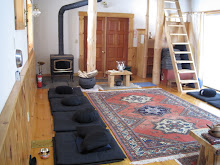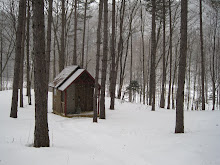Flying away from a week of training for another organization’s staff in Yei, South Sudan. The few-hour drive coming in from Juba was gorgeous, on an ugly road.
Round mud huts with thatched roofs and bamboo fences.
Men sitting under trees and chatting.
Army checkpoints, passed through with a smile and a wave.
Huge, rocky hills with flat tops and green and brown shrubs impossibly rising from the otherwise flat landscape, with only a few trees to otherwise break the flatness.
People seem so gentle, waving and smiling.
The man breaks my heart when he inquires politely:"Can you please offer me a lift to Yei?" and we have to say no because of the history, not because of him.
In the middle of the week of training, the Sudanese People’s Liberation Movement leadership announced a week of holiday so people can go register to vote. I know so little, but basically the vote is a national election, which will set the stage for a referendum in 2011, to determine whether to officially and permanently split South Sudan from the rest of Sudan. A long, hard fight preceded the choice, and there are a lot of fears around it. Almost 70 political parties registered for the election, but the woman who works there told me there is no real choice. She said it is weird when trucks full of men with guns are encouraging people to vote, when there’s no real choice but to vote for them . . .or the Sudanese Government.
Meanwhile back at work, participants agreed to stay through the holiday and the training continued. In the evenings, Evelyn and Jojo (my coworkers from Uganda) and a few great people from UK to Zimbabwe who work in South Sudan, danced and made trouble as best we could. We celebrated the new law against domestic violence that our organizations in Uganda finally pushed parliament to pass. We discovered new wines in individual serving bottles that taste dangerously like juice and strolled around the dusty, flat town full of more round thatched houses, graceful, polite people, and overgrown graveyards. Evelyn became obsessed with getting me a husband so I won’t leave East Africa, and kept pointing out particularly drunken and messy looking soldiers slouching by the side of the road as hot possibilities for me, just to see the look of amused horror on my face.
Today, we fly away, back home to Kampala.
At the field that doubles as the Yei airport, we sat and waited for our tiny plane to land with their passengers from Kampala, so we could get on and they could take us back. A man rolled up in a vehicle decorated in ribbons and bows, to greet a Mzungu (white person) who appeared to be a missionary coming to visit. Jojo laughed out loud, out of earshot of the men, and said to the man seated next to her: “He had to decorate his car to come and pick up the Mzungu!” The man laughed. I turned around, giggling, and asked, “Yeah, so Jojo why don’t you decorate a vehicle and come and get me from the airport?”
“Ah, Sara,” she said, “You’re not a Mzungu anymore. Now you’re part of us.”
Apparently you can cross over, at least with certain people and in certain situations. You can stop being white first, and just be a person.
And it’s somehow a weird, elusive accomplishment.
I’m reading a lot these days about the Haitian revolution. There was a point in Haitian history, after the slave revolt turned successful to create the world’s first independent black republic, where the leadership ordered the killing of all the “whites” in Haiti. I didn’t realize until recently that the definition of “white” wasn’t all about color. If the person was part of the community, if they’d crossed over somehow culturally, then they were no longer white.
It’s such a long road to trust building. Evelyn and Jojo are my sisters, totally—I have finally gotten to that point with them. And here I go again. Off to Haiti, soon, to start new. Hopefully I’m better at it this time. Every time, getting better at being patient, waiting to be adopted by yet another new family to add to mine. . .and getting better at helping others make merciless fun of me in the process, when I still just don't get it.
November 14, 2009
October 27th, 2009- Johannesburg, South Africa
“To be free is not merely to cast off one’s chains, but to live in a way that respects and enhances the freedom of others.” –Nelson Mandela
You enter the Apartheid museum through entrances marked “whites only” or “non-whites only”. For the sake of my visit, I was non-white. The rooms take you through the rise of Apartheid, the brutality, the struggle, and the change. There is room after room of interactive exhibits and footage of the leaders who never made it to the day of Sisulu’s release, the un-banning of the ANC or Mandela’s inauguration. It’s kind of like trying to breathe under water, with the weight of something that should never have been.
The Mandela exhibit has quotes inside the walls of a cell made after the one on Robben Island, as well as introducing you to the people around him that I never learned about in school—as though Apartheid had been toppled by just one man. The quotes and the footage show them to be brave, heroic, and also human—and the storytelling that makes them human makes them so much greater than if they were only entirely heroic. The footage makes them people you can relate to. There is a quote by a fellow ANC political prisoner about Mandela that says something about their time on Robben Island, and how it helped Mandela to grow, and to focus on the spiritual in a way that would never have happened if he hadn’t been forced into it.
I keep wondering: How do you make an experience like that work for you?
Nice to have that first day off to explore the history and current Johannesburg/ Soweto, so I can enter the conference with at least a few more nuances understood. I was invited to present our organization’s work to a bunch of U.S. government representatives, including those from the U.S. Department of Defense in about 14 African countries.
It is a fascinating crowd in which to talk about social change and preventing violence against women. Don’t think I’ve ever felt quite so Che Guevara in a room full of Reagan fans in my life . . .a little bit of shifting uncomfortably, but still some cool people. Three different people have pulled me aside and, completely separately from each other, said “You actually believe in what you do, don’t you? You actually seem to think it works. Maybe I should quit my job.” . . .or something akin to that.
I may not be asked back.
Oops. :)
http://www.apartheidmuseum.org
You enter the Apartheid museum through entrances marked “whites only” or “non-whites only”. For the sake of my visit, I was non-white. The rooms take you through the rise of Apartheid, the brutality, the struggle, and the change. There is room after room of interactive exhibits and footage of the leaders who never made it to the day of Sisulu’s release, the un-banning of the ANC or Mandela’s inauguration. It’s kind of like trying to breathe under water, with the weight of something that should never have been.
The Mandela exhibit has quotes inside the walls of a cell made after the one on Robben Island, as well as introducing you to the people around him that I never learned about in school—as though Apartheid had been toppled by just one man. The quotes and the footage show them to be brave, heroic, and also human—and the storytelling that makes them human makes them so much greater than if they were only entirely heroic. The footage makes them people you can relate to. There is a quote by a fellow ANC political prisoner about Mandela that says something about their time on Robben Island, and how it helped Mandela to grow, and to focus on the spiritual in a way that would never have happened if he hadn’t been forced into it.
I keep wondering: How do you make an experience like that work for you?
Nice to have that first day off to explore the history and current Johannesburg/ Soweto, so I can enter the conference with at least a few more nuances understood. I was invited to present our organization’s work to a bunch of U.S. government representatives, including those from the U.S. Department of Defense in about 14 African countries.
It is a fascinating crowd in which to talk about social change and preventing violence against women. Don’t think I’ve ever felt quite so Che Guevara in a room full of Reagan fans in my life . . .a little bit of shifting uncomfortably, but still some cool people. Three different people have pulled me aside and, completely separately from each other, said “You actually believe in what you do, don’t you? You actually seem to think it works. Maybe I should quit my job.” . . .or something akin to that.
I may not be asked back.
Oops. :)
http://www.apartheidmuseum.org
October 15th, 2009- Kampala- Gain Hips and Bum
Ads plastered all over Kampala say:
“Gain hips and bum!”
“Get FAT (no side effect)”
Standards of beauty here are just different. Women are supposed to have curves.
This morning, I jump on the back of a boda boda (motorcycle used for public transport), too late for my morning meeting to take my usual walk. I greet the driver, and we zip down the bumpy, dust-red path, past the men and boys endlessly crushing rocks in the sun, past the row of market stalls and creeping cars along the trafficked road, and with a wave past the nice man selling drinkable yogurt on the corner, up the hill to the office.
I jump off the boda boda, and the driver smiles as I reach into my purse.
“You come this way every, every day?”
“Yes,” I say, “but usually I come walking.”
“Oh, I see,” he says. “Sorry—you don’t have money . . . I could take you for free sometimes.”
“Thanks—that is very kind! But I like the exercise.”
“Eh!” he says, surprised—tilting his head dramatically to look with slightly intrigued disgust at my skinny bum. “Madam, you do NOT need exercise.”
I tell my coworkers, and they laugh the whole morning. My little bum SO lives on the wrong continent.
“Gain hips and bum!”
“Get FAT (no side effect)”
Standards of beauty here are just different. Women are supposed to have curves.
This morning, I jump on the back of a boda boda (motorcycle used for public transport), too late for my morning meeting to take my usual walk. I greet the driver, and we zip down the bumpy, dust-red path, past the men and boys endlessly crushing rocks in the sun, past the row of market stalls and creeping cars along the trafficked road, and with a wave past the nice man selling drinkable yogurt on the corner, up the hill to the office.
I jump off the boda boda, and the driver smiles as I reach into my purse.
“You come this way every, every day?”
“Yes,” I say, “but usually I come walking.”
“Oh, I see,” he says. “Sorry—you don’t have money . . . I could take you for free sometimes.”
“Thanks—that is very kind! But I like the exercise.”
“Eh!” he says, surprised—tilting his head dramatically to look with slightly intrigued disgust at my skinny bum. “Madam, you do NOT need exercise.”
I tell my coworkers, and they laugh the whole morning. My little bum SO lives on the wrong continent.
Subscribe to:
Comments (Atom)




